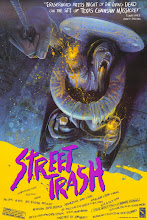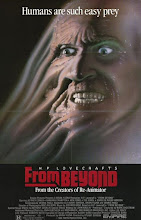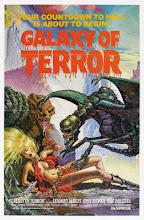Love, life and relationships are complicated. So too is Aaron Moorhead and Justin Benson's Spring. Accurately described as an odd mix of Richard Linklater's romantic character studies and H.P. Lovecraft's The Shadow Over Innsmouth, Spring is as chimeric a beast as those found in Lovecraft's writing. That weird genre pairing is only the outermost layer though, and beneath that is a film with a lot more on its mind.
Spring is the story of Evan, a man trying to leave behind the unhappy complications of his life by escaping into a seductive new existence that seems blissfully simple and trouble-free. It appears that love is in his stars, but the universe is a chaotic and merciless place, and Evan quickly finds that his new situation is far more complicated than anything he could have imagined. Ultimately he will learn that in order to truly love, sacrifices are demanded. Real sacrifices.
Our basest fears, whether they be xenophobic, fear of snakes and spiders, or a simple terror of dark places, are just expressions of our instinctive, hardwired mistrust of the unknown and the other. A primal survival reflex that pushes the rationalism of thousands of years of science and enlightenment to the back of our brains in favour of a knee-jerk defensive response. The conservative nightmares and anxieties that were the foundation of H.P. Lovecraft's writing are a perfect example. On one hand, his stories are brimming with the racist fear of insidious takeover by foreign cultures, and of the resulting breakdown of western civilisation. On the other, his loathsome monsters can be seen to represent a fear of facing the uncensored truth of biological life, resplendent in all its wet, birthing, fucking, suffering, diseased, predatory and frequently ugly glory.
Looking at that latter idea first, I can see Moorhead and Benson's movie as a critique of Lovecraft, and an exploration of nature and our place within it. For me, the film's real romance isn't between the star crossed lovers, but in the sense of wonder that it evokes about the infinite complexity of biological life. Sometimes beautiful, other times hideous, and always messy, life repeats itself endlessly down through the aeons - adapting, surviving and evolving. That it came to exist at all from the raw materials of primordial star dust is incredible. That it's had the tenacity to persevere, thrive and fragment into what seems like infinite varieties just on this planet alone is far more miraculous than any myth that could be dreamt up by the creationist crazies.
But human aesthetics are a fickle thing, and biology isn't always neat and pretty. From what I've gathered over the years (and although I've devoured his fiction I'm far from an expert on the man himself), Lovecraft was a very tightly wound and neurotic man. A product of the uptight New England culture that he was brought up in. He seems like just the kind of conservative puritan that would (and apparently did) have a difficult time resolving his sexual desires with the revulsion that he felt at the awkward, wet realities of sex. It follows that this same revulsion would carry over to every aspect of biological life, not just fucking, and not just human. When faced with a hatching clutch of spider's eggs, an octopus, or a New England beach covered in Horseshoe crabs I can't help but picture his face screwing up in disgust.
Spring, to me, feels like a response to that. A celebration of 3.6 billion years of life on this planet, not to mention the almost certain possibility of life elsewhere in the cosmos. Its message: forget the petty aesthetic judgements and anthropomorphisation that we've imposed on nature. There is no ugliness, no evil, no right and wrong. Those are human constructs. It's all beautiful. Yes, perhaps even the most vile form of life that we know: malignant cancer cells. After all, if cancer hadn't killed Evan's mother, he wouldn't have ended up falling in love.
To tie it all up in a neat bow, I see all that brain-frying, intangible complexity as a fitting metaphor for the utterly weird and disorienting phenomenon we all know as falling in love. Something that we're all a part of, but that's difficult for us to comprehend or control, particularly when we're in the midst of it. You can rationalise it and tell yourself that it's just feelings caused by the release of a potent cocktail of chemicals into your brain, intended to trick you into procreating and spreading our species like so many tumor cells. But that won't make it any less confusing, elating or painful.
As for Lovecraft's xenophobia, there's also a bit of subtext in Spring about the relationship that Americans (and Australians, I should know, I'm both) have with Europe. For new-worlders whose descendants emigrated from Europe, visiting the mother continent can induce a strange mixture of feelings. For some it's a profound sense of awe at being surrounded by so much history, combined with conflicting feelings of deep belonging and unsettling alienation. For others, there's a sense of familiarity and entitlement coupled with xenophobic feelings of distrust and the unknown. We've already seen this explored pretty explicitly in Eli Roth's Hostel movies, but Spring does so in a more thoughtful and mature way. Rather than being the focus (as it is in Roth's movies), it's explored with more subtlety through Evan's eyes. As he strives to assimilate into the rural Italian culture that he's found himself in, we see him observe the idiotic antics of his countrymates with an aloof distaste. Evan's willingness to accept this new culture is rewarded, while the frat boys are punished.
Well, I've gone completely tl;dr with my reading of Spring's themes, so I'm just going to leave the rest of this amazing little film for you to discover for yourself. Benson and Moorhead's direction, writing, cinematography and editing are all spot on, making for a satisfying and handsome movie that belies its undoubtedly low budget. Part of the reason for that is in cinematographer Aaron Moorhead's eye for bringing the best out of the film's atmospheric Italian locations. It's one of the most photogenic places you could ever hope to shoot a movie, and Moorhead exploits moonlit nights, subtly hued magic hours and sunbathed countryside to stunning effect. One sequence in particular, when Evan and Louise take a boat to visit a mysterious aquatic cave, is strikingly beautiful.
The other really noteworthy aspect of Spring's visuals are its superb makeup, prosthetic and creature fx. The team appears to have been comprised of what I assume to be a mix of Italian and American artists, none of whom I've heard of before, and their work here is nothing short of fantastic. The majority of the fx looked to me like a combination of practical with CG enhancement, and the results are by turns gorgeous, shocking and disgusting.
Finally, I have to acknowledge the real heart of the movie, the lovers themselves. Working from Justin Benson's excellent script, Lou Taylor Pucci and Nadia Hilker deliver nuanced, naturalistic performances that are every bit as good as those of Ethan Hawke and Julie Delpy, to which they will inevitably be compared.
Following their powerful 2012 debut, Resolution, these two hungry filmmakers have delivered a second dose of subversive, thought-provoking and highly original horror. I can't wait to see what they've got up their sleeves for their upcoming Aleister Crowley project.


















_poster.jpg)




































































No comments:
Post a Comment